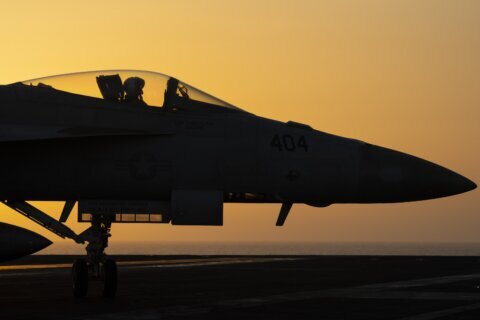MEXICO CITY (AP) — Mexico’s president said Monday that much of the money gained by eliminating independent oversight and regulatory agencies will go to the army to fund a rise in soldiers’ pay.
The announcement by President Claudia Sheinbaum is the latest in a a series of new and unusual funding sources to pay for the country’s increasingly influential military.
Last week, Mexico’s Congress approved charging every cruise ship passenger a $42 immigration fee, with much of that money also going to the armed forces.
Under Sheinbaum’s Morena party, since 2019 the military has been given powers to build and run everything from railways, airports and airlines in Mexico, and some of those projects appear to be losing money.
For over a century before, Mexico’s armed forces were very limited in their actions, restricted from taking any role in politics and didn’t have many business interests. But that all changed under Sheinbaum’s predecessor, Andrés Manuel López Obrador, who saw the army as a loyal, unquestioning ally and a safeguard for his political and policy legacy.
López Obrador, Sheinbaum’s political mentor, also made the armed forces, and the quasi-military National Guard, the country’s main law enforcement forces.
In late November, Mexico’s Senate voted to eliminate seven independent regulatory and oversight agencies, a move that critics warn will cement the ruling party’s power and avoid outside scrutiny.
Sheinbaum called it a money-saving measure, arguing that the government can more efficiently handle functions like freedom of information requests, anti-monopoly enforcement and energy-market regulation.
However, critics and foreign investors and critics fear this could open the door to favoritism and a lack of transparency.
And earlier this month, Mexico’s Senate — controlled by the president’s Morena party — voted to charge cruise ship passengers $42 per head for port calls, drawing sharp criticism from the tourism industry.
Mexican business chambers say the immigration charge — from which cruise passengers used to be exempt — may hurt the country’s $500 million per year cruise industry.
Two-thirds of the money raised from the cruise ship charges would go to the Mexican army, not to improve port facilities.
Moreover, many of the military-run projects appear to be big money losers, which may help explain the government’s urge to find extra funding for the armed forces.
For example, one of López Obrador’s pet projects — the “Maya Train,” a tourist line which runs in a loop around the Yucatan Peninsula — has drawn only 20% of the ridership expected when it was proposed.
The Maya Train started service on Dec. 16, 2023. While it’s not completely finished — two relatively little-used stretches are scheduled to enter service later this months — the most popular and heavily-travelled parts of the line are already in service.
As of Dec. 8, authorities announced the train line had carried a little more than 600,000 passengers in its first 51 weeks. That is only one-fifth of the 3 million passengers authorities had claimed it would carry per year.
On Monday, the government announced a “package tour” deal in which another military-run, money losing project — the government-owned Mexicana airline — would offer flights to stations along the Maya Train line.
The flight would take off, of course, from another military-run project, the new Mexico City Felipe Angeles airport, which is just starting to break even because the government forced cargo planes, and some passenger flights, to use it.
Mexico’s ruling Morena party is already running enormous budget deficits to fund its favorite building projects like railways and oil refineries — some of which are being built by the army. The government is desperate to find new revenue sources.
Copyright © 2024 The Associated Press. All rights reserved. This material may not be published, broadcast, written or redistributed.





